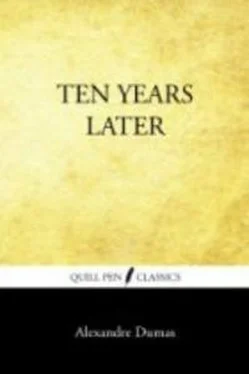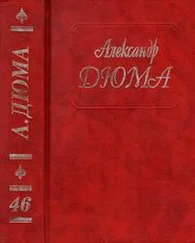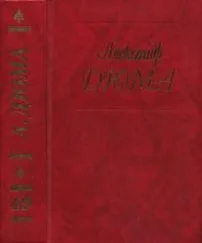Александр Дюма - Ten Years Later
Здесь есть возможность читать онлайн «Александр Дюма - Ten Years Later» весь текст электронной книги совершенно бесплатно (целиком полную версию без сокращений). В некоторых случаях можно слушать аудио, скачать через торрент в формате fb2 и присутствует краткое содержание. Год выпуска: 2014, Издательство: epubBooks Classics, Жанр: Исторические приключения, на английском языке. Описание произведения, (предисловие) а так же отзывы посетителей доступны на портале библиотеки ЛибКат.
- Название:Ten Years Later
- Автор:
- Издательство:epubBooks Classics
- Жанр:
- Год:2014
- ISBN:нет данных
- Рейтинг книги:4 / 5. Голосов: 1
-
Избранное:Добавить в избранное
- Отзывы:
-
Ваша оценка:
- 80
- 1
- 2
- 3
- 4
- 5
Ten Years Later: краткое содержание, описание и аннотация
Предлагаем к чтению аннотацию, описание, краткое содержание или предисловие (зависит от того, что написал сам автор книги «Ten Years Later»). Если вы не нашли необходимую информацию о книге — напишите в комментариях, мы постараемся отыскать её.
Ten Years Later — читать онлайн бесплатно полную книгу (весь текст) целиком
Ниже представлен текст книги, разбитый по страницам. Система сохранения места последней прочитанной страницы, позволяет с удобством читать онлайн бесплатно книгу «Ten Years Later», без необходимости каждый раз заново искать на чём Вы остановились. Поставьте закладку, и сможете в любой момент перейти на страницу, на которой закончили чтение.
Интервал:
Закладка:
Ten Years Later
Alexandre Dumas
Chapter I.
In Which D'artagnan Finishes by at Length Placing His Hand Upon His Captain's Commission.
The reader guesses beforehand whom the usher preceded in announcing the courier from Bretagne. This messenger was easily recognized. It was D'Artagnan, his clothes dusty, his face inflamed, his hair dripping with sweat, his legs stiff; he lifted his feet painfully at every step, on which resounded the clink of his blood–stained spurs. He perceived in the doorway he was passing through, the superintendent coming out. Fouquet bowed with a smile to him who, an hour before, was bringing him ruin and death. D'Artagnan found in his goodness of heart, and in his inexhaustible vigor of body, enough presence of mind to remember the kind reception of this man; he bowed then, also, much more from benevolence and compassion, than from respect. He felt upon his lips the word which had so many times been repeated to the Duc de Guise: "Fly." But to pronounce that word would have been to betray his cause; to speak that word in the cabinet of the king, and before an usher, would have been to ruin himself gratuitously, and could save nobody. D'Artagnan then, contented himself with bowing to Fouquet and entered. At this moment the king floated between the joy the last words of Fouquet had given him, and his pleasure at the return of D'Artagnan. Without being a courtier, D'Artagnan had a glance as sure and as rapid as if he had been one. He read, on his entrance, devouring humiliation on the countenance of Colbert. He even heard the king say these words to him:—
"Ah! Monsieur Colbert; you have then nine hundred thousand livres at the intendance?" Colbert, suffocated, bowed but made no reply. All this scene entered into the mind of D'Artagnan, by the eyes and ears, at once.
The first word of Louis to his musketeer, as if he wished it to contrast with what he was saying at the moment, was a kind "good day." His second was to send away Colbert. The latter left the king's cabinet, pallid and tottering, whilst D'Artagnan twisted up the ends of his mustache.
"I love to see one of my servants in this disorder," said the king, admiring the martial stains upon the clothes of his envoy.
"I thought, sire, my presence at the Louvre was sufficiently urgent to excuse my presenting myself thus before you."
"You bring me great news, then, monsieur?"
"Sire, the thing is this, in two words: Belle–Isle is fortified, admirably fortified; Belle–Isle has a double enceinte , a citadel, two detached forts; its ports contain three corsairs; and the side batteries only await their cannon."
"I know all that, monsieur," replied the king.
"What! your majesty knows all that?" replied the musketeer, stupefied.
"I have the plan of the fortifications of Belle–Isle," said the king.
"Your majesty has the plan?"
"Here it is."
"It is really correct, sire: I saw a similar one on the spot."
D'Artagnan's brow became clouded.
"Ah! I understand all. Your majesty did not trust to me alone, but sent some other person," said he in a reproachful tone.
"Of what importance is the manner, monsieur, in which I have learnt what I know, so that I know it?"
"Sire, sire," said the musketeer, without seeking even to conceal his dissatisfaction; "but I must be permitted to say to your majesty, that it is not worth while to make me use such speed, to risk twenty times the breaking of my neck, to salute me on my arrival with such intelligence. Sire, when people are not trusted, or are deemed insufficient, they should scarcely be employed." And D'Artagnan, with a movement perfectly military, stamped with his foot, and left upon the floor dust stained with blood. The king looked at him, inwardly enjoying his first triumph.
"Monsieur," said he, at the expiration of a minute, "not only is Belle–Isle known to me, but, still further, Belle–Isle is mine."
"That is well! that is well, sire, I ask but one thing more," replied D'Artagnan.—"My discharge."
"What! your discharge?"
"Without doubt I am too proud to eat the bread of the king without earning it, or rather by gaining it badly.—My discharge, sire!"
"Oh, oh!"
"I ask for my discharge, or I will take it."
"You are angry, monsieur?"
"I have reason, mordioux! Thirty–two hours in the saddle, I ride day and night, I perform prodigies of speed, I arrive stiff as the corpse of a man who has been hung—and another arrives before me! Come, sire, I am a fool!—My discharge, sire!"
"Monsieur d'Artagnan," said Louis, leaning his white hand upon the dusty arm of the musketeer, "what I tell you will not at all affect that which I promised you. A king's word given must be kept." And the king going straight to his table, opened a drawer, and took out a folded paper. "Here is your commission of captain of musketeers; you have won it, Monsieur d'Artagnan."
D'Artagnan opened the paper eagerly, and scanned it twice. He could scarcely believe his eyes.
"And this commission is given you," continued the king, "not only on account of your journey to Belle–Isle but, moreover, for your brave intervention at the Place de Greve. There, likewise, you served me valiantly."
"Ah, ah!" said D'Artagnan, without his self–command being able to prevent a blush from mounting to his eyes—"you know that also, sire?"
"Yes, I know it."
The king possessed a piercing glance and an infallible judgment when it was his object to read men's minds. "You have something to say," said he to the musketeer, "something to say which you do not say. Come, speak freely, monsieur; you know that I told you, once and for all, that you are to be always quite frank with me."
"Well, sire! what I have to say is this, that I would prefer being made captain of the musketeers for having charged a battery at the head of my company, or taken a city, than for causing two wretches to be hung."
"Is this quite true you tell me?"
"And why should your majesty suspect me of dissimulation, I ask?"
"Because I have known you well, monsieur; you cannot repent of having drawn your sword for me."
"Well, in that your majesty is deceived, and greatly; yes, I do repent of having drawn my sword on account of the results that action produced; the poor men who were hung, sire, were neither your enemies nor mine; and they could not defend themselves."
The king preserved silence for a moment. "And your companion, M. d'Artagnan, does he partake of your repentance?"
"My companion?"
"Yes, you were not alone, I have been told."
"Alone, where?"
"At the Place de Greve."
"No, sire, no," said D'Artagnan, blushing at the idea that the king might have a suspicion that he, D'Artagnan, had wished to engross to himself all the glory that belonged to Raoul; "no, mordioux! and as your majesty says, I had a companion, and a good companion, too."
"A young man?"
"Yes, sire; a young man. Oh! your majesty must accept my compliments, you are as well informed of things out of doors as things within. It is M. Colbert who makes all these fine reports to the king."
"M. Colbert has said nothing but good of you, M. d'Artagnan, and he would have met with a bad reception if he had come to tell me anything else."
"That is fortunate!"
"But he also said much good of that young man."
"And with justice," said the musketeer.
"In short, it appears that this young man is a fire–eater," said Louis, in order to sharpen the sentiment which he mistook for envy.
"A fire–eater! Yes, sire," repeated D'Artagnan, delighted on his part to direct the king's attention to Raoul.
"Do you not know his name?"
"Well, I think—"
"You know him then?"
Читать дальшеИнтервал:
Закладка:
Похожие книги на «Ten Years Later»
Представляем Вашему вниманию похожие книги на «Ten Years Later» списком для выбора. Мы отобрали схожую по названию и смыслу литературу в надежде предоставить читателям больше вариантов отыскать новые, интересные, ещё непрочитанные произведения.
Обсуждение, отзывы о книге «Ten Years Later» и просто собственные мнения читателей. Оставьте ваши комментарии, напишите, что Вы думаете о произведении, его смысле или главных героях. Укажите что конкретно понравилось, а что нет, и почему Вы так считаете.












